Candles line the walkway to the entrance of First Presbyterian Church of Bethlehem as people enter the door, sign in and pin purple ribbons to their shirts.
To the left of the main entrance, some take their seats in a sea of folding chairs while listening to the soothing melody of a singer strumming her guitar.
To the right, the music grows distant as others tilt their heads down to look at tables crowded with individual place settings. What appears to be a table set for dinner, accompanied by silverware, napkins and candles, is actually a memorial.
“In honor of all victims who have died due to domestic violence,” reads a light purple card atop a place setting, representing a life lost to abuse and marking the space their death left behind.
“An Empty Place at the Table,” a memorial project which honors victims of domestic violence, was displayed at Turning Point of Lehigh Valley’s survivor vigil on Oct. 17, 2024. The annual event commemorates survivors and those who lost their lives to domestic and intimate partner abuse.
Each year, more than 10 million people are abused nationwide, according to the Pennsylvania Coalition Against Domestic Violence.
The coalition reported that in 2023, 119 victims in Pennsylvania lost their lives to domestic violence — 77 females and 42 males.
Established in 1978, Turning Point aims to eliminate domestic and intimate partner abuse in the Lehigh Valley through survivor empowerment, community education and engagement. From its 24-hour helpline to annual vigils, the nonprofit organization raises awareness for thousands who are affected in the Lehigh Valley each year.
Panayiota Papadopoulos, a training and education advocate at Turning Point, said the organization answered 3,668 helpline calls and served about 3,890 survivors and their children from 2023 to 2024.
She also said the organization changed its terminology in 2019, replacing “domestic violence” with “domestic and intimate partner abuse.”
“Many people think, ‘Well, it hasn’t gotten violent, so maybe these services are for others who have it worse,'” Papadopoulos said. “We use the term ‘abuse’ intentionally, because we want everyone to know they deserve support, whether the abuse is physical, sexual, emotional or verbal.”
Papadopoulos said the organization extends support throughout Lehigh and Northampton Counties, from hospitals and college campuses to faith centers and hair salons, teaching people to recognize these forms of abuse and connect survivors with resources.
Turning Point partners with organizations like the Bradbury-Sullivan LGBT Community Center and the Lehigh Valley Center for Independent Living to provide training programs, tailoring their approach to address specific community needs.
These activities vary from recognizing abuse in LGBTQ+ relationships to understanding barriers faced by people with disabilities and older adults, particularly those in long-term relationships.
The organization also provides multilingual resources by offering interpreter services at events, as well as bilingual advocates on staff.
This commitment extends to its biggest event of the year, where Turning Point intentionally seeks diverse perspectives to challenge misconceptions about those who are affected by domestic and intimate partner abuse.
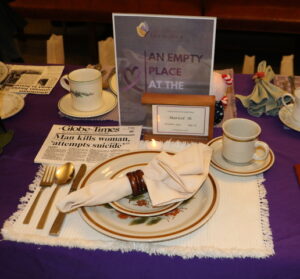
“An Empty Place at the Table,” a memorial project which honors victims of domestic violence, was displayed at Turning Point of Lehigh Valley’s survivor vigil on Oct. 17, 2024. (Caitlyn Hall/ B&W Staff)
At the 2024 vigil, one survivor took the stage and revealed what he called his “invisible identities” — being a gay, male survivor over the age of 50.
He said he represents communities often overlooked in domestic and intimate partner abuse discussions.
Age stereotypes not only contribute to abuse later in life but also prevent older survivors from seeking help, according to the World Health Organization, which estimates that one in six older people experience abuse.
Papadopoulos said abuse rates are even higher when including emotional and verbal abuse, especially among individuals with disabilities.
“Over 50% of people with disabilities experience abuse, often because their (abusive) partner is also their caregiver,” she said.
She also said the training team works to challenge the misconception that only women experience domestic and intimate partner abuse.
“We serve all survivors,” she said. “The statistics are clear. Over one in three women, one in four men, one in three LGBTQ+ individuals, and more than half of transgender and nonbinary people experience physical abuse from a partner.”
Crime Victims Council of the Lehigh Valley, a nonprofit serving Northampton and Lehigh Counties, provides support and assistance to victims of all forms of violence and crime — including sexual assault and sexual violence.
Since cases of sexual violence and sexual abuse often overlap within domestic and intimate partner abuse situations, Papadopoulos said Crime Victims Council and Turning Point of Lehigh Valley frequently collaborate. She said they work in partnership to support each other’s efforts by providing services to survivors
Brooke DeSipio, a board member of Crime Victims Council, said the organizations’ leadership teams hold regular meetings to coordinate responses to abuse cases.
A key distinction between the organizations, she said, is Turning Point maintains an emergency shelter safe house option as well as housing advocacy support, while Crime Victims Council focuses on connecting survivors with alternative housing options.
Papadopoulos said Turning Point’s first emergency shelter opened in 1980 to address what was the “biggest need at the time.” This shelter, located in Bethlehem, was later converted into a counseling and advocacy office as services expanded.
Today, Turning Point operates a confidential, emergency safe house shelter with 24-hour staff coverage for survivors of domestic and intimate partner abuse, according to the organization’s website.
When the shelter reaches capacity, DeSipio said, the two organizations collaborate to find alternative safe housing options.
The organizations also differ in their counseling approaches.
While Turning Point uses an empowerment model for its free counseling and safety planning, Crime Victims Council provides free clinical therapy through licensed social workers and professional counselors.
Papadopoulos said Turning Point is adamant about using the term “survivor” instead of “victim,” because the organization centers its services around this model of empowerment.
“When someone experiences abuse, their power and control are often taken away,” she said. “By using ‘survivor,’ we help put that power back in their hands. While some people prefer ‘victim,’ and that’s okay, we default to ‘survivor’ to help people relearn independence and reclaim their life.”
DeSipio said Crime Victims Council also serves a broader population, supporting victims and survivors of crime and violence — including domestic and intimate partner abuse — as well as their families and significant others who may be impacted.
She also works extensively with students experiencing various forms of abuse as the director of Lehigh’s Office of Survivor Support and Intimacy Education.
DeSipio said she reaches many students on campus experiencing various forms of abuse through this role, but her position doesn’t grant authority in court matters when an individual decides to pursue legal action.
However, when students are navigating criminal proceedings, she said Crime Victims Council and Turning Point collaborate to guide students through the process.
“It’s really important that our students are also getting connected with folks from these different agencies,” DeSipio said. “We want students to get the comprehensive support they need.”
Rita Lilly, a legal advocate at Turning Point, emphasized that while the organization’s legal team helps survivors navigate the court system, it cannot provide legal advice as the staff members aren’t attorneys.
The team offers free legal advocacy services for survivors of all gender identities, according to Turning Point’s legal advocacy webpage.
These services include court accompaniment, assistance with victim’s compensation and rights, safety planning and Protection From Abuse — civil legal orders that protect survivors from their abusers.
Lilly said Turning Point maintains offices in both Lehigh and Northampton County courthouses to support individuals unfamiliar with court procedures.
“Many survivors come to us scared, because they’ve never been through this process before,” Lilly said. “We’re here to help them stay calm, understand their options and know they don’t need a (Protection From Abuse) order to receive our services. We support whatever decision they make.”
She said when a survivor seeks protection through a Protection From Abuse order, a judge can immediately issue a temporary order after hearing the petitioner’s testimony.
According to the 2023 Pennsylvania Protection From Abuse order caseload, of the 1,567 Protection From Abuse cases filed in Lehigh County, 1,335 temporary orders were granted following court hearings. Similarly, in Northampton County, judges granted 971 temporary orders out of 1,088 cases filed.
Lilly explained that while a temporary Protection From Abuse provides the same legal protections, it only remains in effect until a final hearing occurs — typically within seven to 10 days after the order is granted.
At the final hearing, Lilly said, both parties must appear before the judge, who then decides whether to grant a final Protection From Abuse — which can remain in effect for up to three years.
She also emphasized that Turning Point’s services, including legal advocacy, are confidential and extend support to all survivors of intimate partner and domestic abuse — regardless of their circumstances.
“It takes tremendous courage to ask for help, especially when abusers have made survivors feel ashamed and blame themselves,” Lilly said. “We want them to know we’re here as a confidential and safe space to talk, whether they decide to stay or leave.”
Healing through writing: Survivor shares story
Author, poet, performer, storyteller, speaker, advocate and mother — these are just a few of the ways Lainie Belcastro describes herself.
Belcastro, 77, has held numerous book signings across the Lehigh Valley, including recent appearances at the Moravian Book Shop and Barnes & Noble.
Her work as an author includes the children’s book “Grrreg and the Bear and His Cousin Pierre,” co-authored with her daughter, Nika, and contributions to the Chicken Soup for the Soul books.
Belcastro’s story “I Whispered, Yes…,” which details her experience with domestic violence, was featured in Chicken Soup for the Soul’s book “The Advice That Changed My Life.”
After the book was published, she sent it to Turning Point of Lehigh Valley. She was then invited to be the keynote speaker at their annual survivor vigil in October 2023.
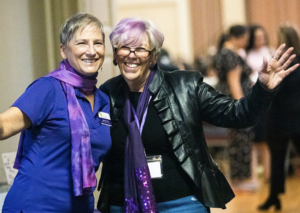
Dana Zamolyi, left, a healthcare response coordinator at Turning Point of Lehigh Valley, and Lainie Belcastro are pictured on Oct. 17, 2024 at Turning Point’s annual survivor vigil. The event commemorates survivors and those who lost their lives to domestic and intimate partner abuse. (Courtesy of Turning Point of Lehigh Valley)
But 52 years ago, Belcastro’s life looked much different. At 25, she was building her career as a vocalist, touring as a contemporary, musical theater and classical artist.
She said she remembers when two men approached her in a New York City hotel lobby, promising a career-changing soap opera audition.
Belcastro said what seemed like an exciting opportunity turned violent — she was drugged, assaulted and trapped in a hotel room until the following morning.
“I had never done drugs in my life,” Belcastro said. “I was a virgin, and it was just a horribly demeaning, painful experience. I came from a devout Catholic family, and back then, you just didn’t talk about things like this.”
Following the assault, fear kept Belcastro from performing. That was until she felt her mother’s heartbreak.
“My mother told me, ‘You must perform, because they’ve already taken something very precious from you. But don’t let them take everything. You’re a singer and you need to sing,’” Belcastro said. “And after that, I went back and did the show.”
She then went on a six-month hiatus from performing and created a support group for rape survivors — a rarity at the time.
Working with a local nun in Morris County, New Jersey, she organized meetings for a small group of women, creating a safe space for healing. She reached out to social workers, doctors and churches, offering her contact information to those in need.
She later met her husband, one of the medical professionals she approached.
What followed was a marriage marked by escalating domestic abuse, especially during her pregnancy. Belcastro said family members began noticing warning signs she couldn’t yet recognize.
She said the moment everything changed for her was when her daughter, Nika, was four months old.
“I really thought he was going to kill me one day,” Belcastro said, “And my sister gave me an ultimatum saying, ‘Leave him, or you can never call Mom or me again. Your husband is determined to destroy you and the baby. Leave him and find yourself.’”
Despite concerns about burdening her widowed mother and becoming the first in her family to divorce, Belcastro said she found the strength to leave, whispering “a quiet yes” to her sister’s plea.
This moment, captured in her story “I Whispered, Yes…,” represents more than just her experience with domestic violence. She said writing, storytelling and faith guided her journey of transforming pain into creative expression, helping her discover her version of “happily ever after.”
When Belcastro reflected on speaking at the annual survivor vigil, she said “it really felt like coming full circle.”
“It just resonated for the rest of my life,” she said. “I look back now, and what a journey it’s been, one of incredible strength. I feel very seen, especially by Turning Point.”

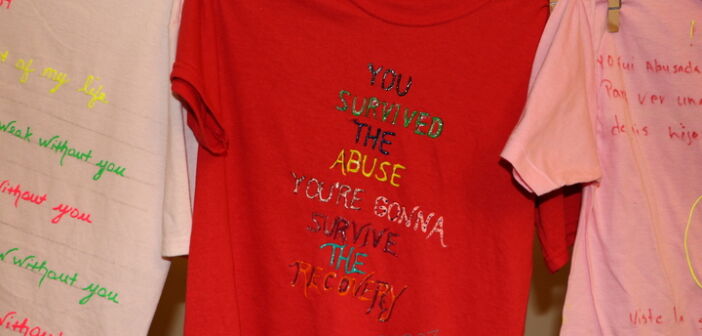


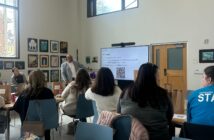
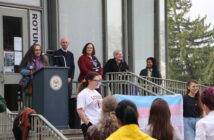
Comment policy
Comments posted to The Brown and White website are reviewed by a moderator before being approved. Incendiary speech or harassing language, including comments targeted at individuals, may be deemed unacceptable and not published. Spam and other soliciting will also be declined.
The Brown and White also reserves the right to not publish entirely anonymous comments.
1 Comment
What a beautiful article and testimony of how pain and struggle can become strength and resilience. So grateful to organizations like Turning Point, Crime Victims Council, and to the brave survivors like Lainie and those at the vigil who bare their souls with us in hopes of healing, awareness, and empowerment. Thank you, Caitlyn and Lehigh/B&W crew, for this feature and for shining a light on this issue for those who need the support!